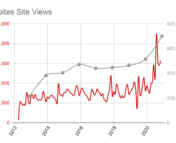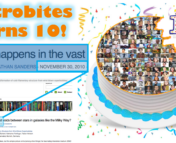Happy anniversary to us! Ten years ago, on November 30th 2010, Astrobites released its first article. Nearly every weekday since then, a new article was published on Astrobites. We have covered over 2,700 research papers from the ArXiv with the goal of summarizing the most recent astronomy research and making it available and accessible to undergrads and the public. In today’s post, we’d like to share with you some of the most popular articles of Astrobites.
With over 2,800 posts over the last 10 years, which have been the most popular? Today, we take a look at the top ten most popular Astrobites of all time (measured by number of total views).
Top 10 Daily Science Posts:
- The Alternative to Dark Matter May be General Relativity Itself — A guest post from an undergraduate at Nanjing University, this bite looks into general relativity as a way to explain observations of disk galaxies without modified Newtonian dynamics (MOND) or dark matter. [2020]
- Where do hypervelocity stars come from? — A classic paper and a classic post from all the way back in 2013, this bite tries to explain where hypervelocity stars get their speed from. [2013]
- The Prisoner’s Dilemma: A New Solution to an Age Old Problem — This bite showcases a new solution to a classic problem in game theory—The Prisoner’s Dilemma—and suggests we consider re-examining other “solved” problems in science. [2012]
- Review Article: Protoplanetary Disks and Their Evolution — Review articles are scientific articles that summarize the current state of the field; this bite covers a review about protoplanetary disks, the mosh pits of gas, dust, and debris where planets form. [2011]
- A Different Kind of World Changing Disaster: Another Carrington Event — What would happen if a large geomagnetic storm hit Earth now? This bite will tell you, describing yet another way 2020 could get more wild. [2020]
- Black holes — Do they grow stupendously large? — We know about supermassive black holes, but what about stupendously large black holes? This bite covers research on how things like this could form and what they’d be like. [2020]
- Could Mars have experienced a colossal global warming? — We’ve heard Mars could have been warmer and wetter, but how? This bite looks at some exciting climate modeling that tries to explore how Mars could have once hosted liquid water on its surface. [2015]
- The Bullet Cluster — A Smoking Gun for Dark Matter! — Observations of the Bullet Cluster, an example of galaxy mergers, add evidence for dark matter in this bite. [2016]
- When Stars Align — A bite about microlensing and how it works! [2015]
- Arecibo Detects a Fast Radio Burst — Since the first FRB (lovingly known as a “furby”) was discovered in 2007, scientists have been trying to figure out what these strange phenomena are. This bite details observations of a FRB observed with Arecibo, the first one seen by a telescope other than Parkes! [2014]
Top 10 “Beyond” Posts:
- The verbal GRE: Dirty secrets on its role in grad school admission — How does the General GRE fit into astronomy graduate admissions? People tend to think it’s the math section, but this bite tells us about the surprising focus on the verbal section. [2012]
- The Proposed US Tax Plan — A guest post detailing the 2017 proposed tax plan that would have had a disastrous impact on graduate students. [2017]
- Why do you love astronomy? — Personal musings on why one of the authors loves astronomy. [2013]
- What do we want graduate school to be? — A discussion on what the graduate student experience should be like, guided by a survey of our readers. [2012]
- Careers In Astronomy: What am I doing with my life?? — Astronomy career profiles (both in and out of academia!) from the AAS. [2011]
- #BlackInAstro: How Can We Support Black Astronomers? — The cornerstone post of our #BlackInAstro series. [2020]
- Jobs for Astronomers: careers beyond the academic horizon — A guest post from Ioanna Arka, a postdoc who left academia. [2013]
- Beyond Chi-Squared: An Introduction to Correlated Noise — Technically beyond astronomy, but a lot of astronomy has to do with understanding the noise in your data. This bite delves into correlated noise and the related statistics. [2014]
- What If I Am Not Accepted Into a PhD Program? (U.S.) — In competitive graduate school admissions, many students face this situation. So, what happens next? [2018]
- The Incredible Women of Hidden Figures — A guest post from an undergraduate student, this bite explores the real life women behind Hidden Figures. [2020]
Top 10 Resources / Guides:
- How to use SAO ds9 to examine astronomical images — An introduction to SAO ds9, the software used to view FITS files, a common file type for astronomical data. [2011]
- So You Want to Apply for an REU…Here’s How — REUs (Research Experiences for Undergraduates) are a way for undergrads to get research experience. This guide shows you how to apply! [2013]
- Guide to Astrophysical Software — A quick rundown of some of the programming languages and packages common in astronomy.
- Installing and Running Gadget-2 — A guide to the Gadget-2 hydrodynamics code. [2011]
- Guide to Spectroscopy and Spectral Lines — Spectroscopy is nearly ubiquitous in astronomy. Here’s an intro to it!
- Guide to Classification of Galaxies and AGNs — Quick notes on types of galaxies and AGN!
- How to Apply for Grad School in Europe — A guide to applying to physics/astro grad school, European edition! [2014]
- Running your first SPH simulation — A sequel to the intro to Gadget-2, detailing how to run a smoothed particle hydrodynamics simulation. [2012]
- Applying to grad school in the U.S.: a timeline — A guide to applying to physics/astro grad school, American edition! [2014]
- How to submit a paper — Once you’ve done some research, it’s time to publish. We’ll help you figure out how! [2012]
Thanks for reading with us, and we can’t wait to see what new favorites will be published in the future!
Astrobite edited by: Briley Lewis, Haley Wahl, Jenny Calahan, Amber Hornsby
Featured image credit: Michael Hammer for Astrobites




